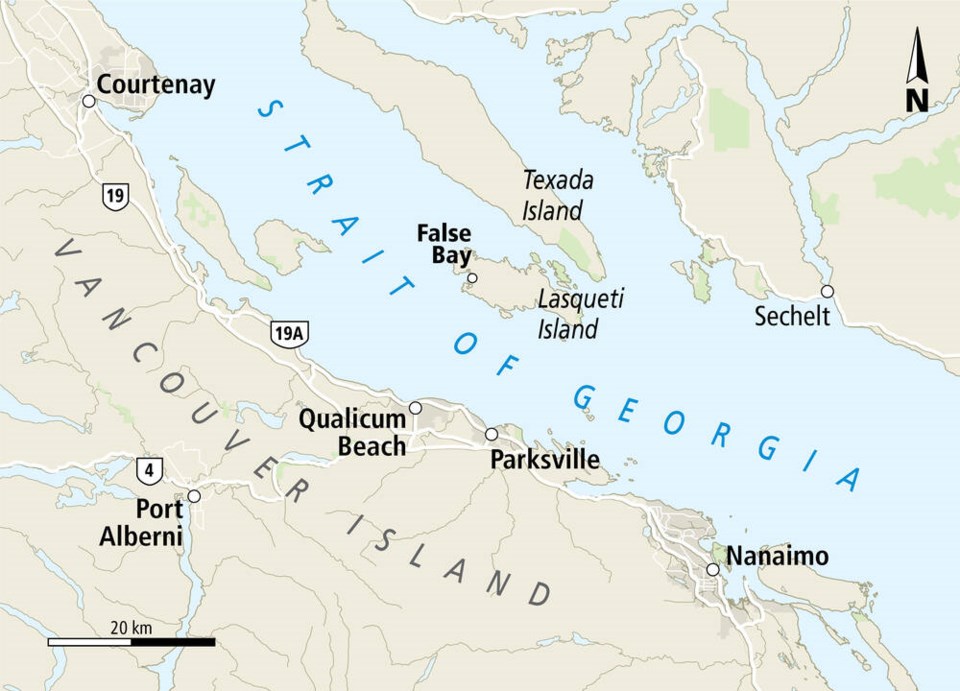Here’s an eyebrow-raiser: federal health authorities just paid for a float plane to pick up a woman’s COVID test from Lasqueti Island.
No, this is not an April Fool’s story.
When Karla Lironi landed at Vancouver airport upon arrival from Mexico on March 20, she was among those randomly selected to take a COVID test at home. And when retrieving the completed test from her isolated island home proved a challenge, a plane was sent to fetch it on Wednesday
Turns out this isn’t an isolated case, either. Lironi was told aircraft have been flying into other remote coastal communities to pick up COVID tests.
Ottawa defends the practice, saying it’s part of providing equal service to all Canadians.
This is happening even as ╬┌Ð╗┤½├¢ eases its COVID-testing rules for travellers.
As of today, fully vaccinated people no longer need to take a test before entering ╬┌Ð╗┤½├¢. They can still be randomly selected for testing once they get here, though.
That’s what happened to the Lasqueti woman when she was handed a test kit at the airport.
Lironi actually hoped the feds would forget about her test once they realized the logistical hurdles. “I live in a really remote place,” she told them.
It took her two days just to get from the Vancouver airport to Lasqueti, an island of just 400 residents (not counting the feral sheep) and few of the trappings of urban life.
It’s accessible mostly by a passenger-only ferry that makes the hour-long crossing from French Creek, near Parksville, two or three times a day, five or six days a week.
In a place where residents must generate their own electricity — power comes from diesel generators, windmills, solar panels and similar sources — internet access can be sketchy. Ditto for cell service. There’s no drive-through testing centre where nurses stick things up your nose.
Still, the authorities insisted Lironi go through with the test, so she arranged to self-administer it under the online supervision of someone from LifeLabs on March 26.
OK, she said, where should I bring the completed test? She figured she would give it to a ferry-riding neighbour to drop off at a pharmacy in Parksville, which is what Lasqueti residents had done in the past. (Post-arrival tests were mandatory for international travellers until last August.)
No, Lironi was told, you can’t leave the tests at that pharmacy anymore. We’ll send a courier to your house to pick it up. What’s your street address?
Er, there are no street addresses on Lasqueti, she replied. Also, there’s no car ferry, so how are you going to send a courier?
That’s when she was instructed to meet the float plane at the False Bay dock on Wednesday, which is what she did.
Lironi and others were left shaking their heads. Even without considering the cost to taxpayers, what about the environmental footprint? Note that the flight took place the day after Justin Trudeau released Ottawa’s latest road map for fighting climate change.
Also, by the time the plane landed at Lasqueti, it was 10 days since Lironi had arrived in ╬┌Ð╗┤½├¢, and four since she had taken the test.
“What’s the point?” asks Lironi’s neighbour, Robin Jacobs. “It’s hard to figure out how that is a cost-effective way of protecting public health.”
The Public Health Agency of ╬┌Ð╗┤½├¢ stands by its approach, though. “╬┌Ð╗┤½├¢ is a vast country, with communities that are sometimes quite far away from urban centres,” it said Thursday. “Whether they reside in urban or rural sectors, everyone has a right to receive the same quality of services.”
PHAC said it has contracts with a variety of providers (Lironi dealt with a Lower Mainland medical-logistics company) to support the Canadian Border Testing Program. “Each contract requires a testing provider to administer all facets of testing requirements under the program, which includes the co-ordination and collection of any virtually observed tests.”
The federal agency would not divulge how much the Lasqueti flight cost. “As each of these contracts contains pricing that are confidential and commercially sensitive in nature, PHAC is not able to share any specific costs related to specific tests that have been administered.”
It should be noted that in December, a federal auditor-general’s report found that PHAC should improve its enforcement of the testing program. An examination of the period from March 2020 to August 2021 found 26 per cent of travellers did not complete post-arrival tests as required.
The report said PHAC had spent $614 million on border measures during that period, with $342 million of that going to COVID testing.



